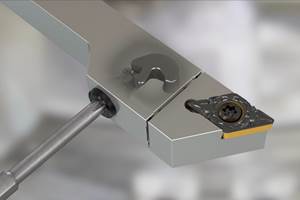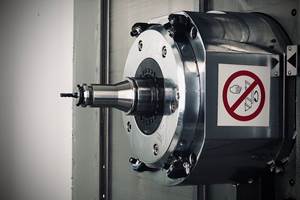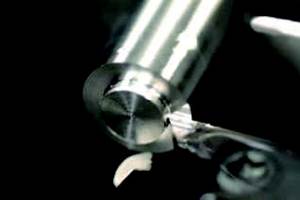Thread Milling for Oil and Gas Parts
Emuge Corp. offers new options that make thread milling a more capable, predictable and economical operation for companies machining today’s parts for oil, gas and petrochemical applications.
Share






Thread milling is an increasingly popular option for companies machining today’s parts for oil, gas and petrochemical applications. Cutting tool manufacturers such as Emuge Corp. (West Boylston, Mass.) are responding with offerings that make thread milling a more capable, predictable and economical operation for these parts. The current boom in U.S. gas and oil production is one factor driving this shift. Another, more telling factor is that some of these parts are also likely to be different than the “oilpatch” parts once dominant in this industry. Although those parts still account for many of the machining jobs for oil and gas, the latest generation of parts is diverse and more challenging to machine.
Workpiece materials such as titanium, Inconel, chrome-moly steels, stainless and other high-nickel alloys are now frequently encountered. To make these parts, shops have to think more like their aerospace counterparts, rather than like the traditional oilpatch jobber.
One area that reflects this new paradigm most acutely is hole threading. Producing high-quality threaded holes is not trivial in any application, but it is especially critical in parts designed to function deep under seawater, miles below the surface of the earth, or at well heads and rigs where workers are present. Threaded holes are a common feature in these parts, but the hole diameters, hole depths and thread forms vary, thus requiring a flexible as well as capable approach.
For example, Emuge’s newly expanded range of thread milling tools features special designs in solid carbide thread mills and inserted thread milling systems. These designs are tailored for milling high-quality threads in tough-to-machine alloys, but are available as standard catalog items so that availability is not a concern when emergency repair work or other contingencies require a short turnaround.
The solid carbide thread mills exhibit a left-hand spiral flute, increased flute count, enlarged core diameter and multilayered TiAlN-T46 coating. The combined effect of these design features results in high feed rates, reduced cycle times, machining with little or no vibrations, reduced tool wear, and fine thread surface finishes, the company says. For example, by feeding the tool into the workpiece in a counter-clockwise direction, the left-hand flute generates axial forces that drive the toolholder into the spindle taper. Compared with a right-hand spiral or straight-cut flutes, design increases cutting stability under high feed rates and counters harmonics, which can cause cracked or split threads and other defects.
These thread mills are available with internal coolant capability for UNC, 8UN and 12UNF thread forms. In addition, thread mills for NPT and API LP thread-form sizes with extended milling section and external coolant are available. These thread mills are also capable of machining multiple thread sizes with one tool. Twenty different tools in inch and metric shanks are available for a range of thread forms/sizes.
Inserted thread milling systems in the program feature inserts and tool bar bodies engineered to produce large internal threads efficiently. The design features a single row of inserts, which gives it a significant advantage over blade-style inserts with formed teeth, developers say. The chief advantage of the single-row insert configuration is that it produces much lower radial pressure when milling thread forms to their full depth.
The formed teeth on a blade-style insert do not withstand this pressure well because of their relatively slender profile and simple geometry (lack of relief angles). In contrast, on the Emuge system, inserts are affixed side-downward to the end face of the cutter body into an EDMed pocket. All cutting forces are directed against the entire face of the insert. Precision-ground rake and relief angles on the inserts enable it to carry a high chip-per-tooth load for increased metal removal rates without degrading thread quality.
Other advantages of this style of insert over the toothed blade insert include faster mounting and indexing (one setscrew per insert); four usable cutting edges; the option to use a partial thread profile to make a number of pitch combinations without a tool change; and the ability to produce threads to the full length of a deep hole without axial stepdowns, which can create blending issues.
Inserts are available in Acme, Stub Acme, NPT and API LP design specifications, plus NPT and API LP full and partial profiles. Tool bar bodies feature a modular design with insert pockets in four sizes for interchangeability on CNC machines with Weldon-style shanks. CAT50 and DIN/SK 50 shank designs are also offered.
Related Content
Quick-Change Tool Heads Reduce Setup on Swiss-Type Turning Centers
This new quick-change tooling system enables shops to get more production from their Swiss turning centers through reduced tool setup time and matches the performance of a solid tool.
Read MoreHow to Troubleshoot Issues With Tool Life
Diagnosing when a tool is failing is important because it sets an expectation and a benchmark for improvements. Finding out why gives us a clue for how to fix it.
Read MoreBriquetting Manufacturer Tools Up for Faster Turnaround Times
To cut out laborious manual processes like hand-grinding, this briquette manufacturer revamped its machining and cutting tool arsenal for faster production.
Read MoreToolpath Improves Chip Management for Swiss-Type Lathes
This simple change to a Swiss-type turning machine’s toolpath can dramatically improve its ability to manage chips.
Read MoreRead Next
AMRs Are Moving Into Manufacturing: 4 Considerations for Implementation
AMRs can provide a flexible, easy-to-use automation platform so long as manufacturers choose a suitable task and prepare their facilities.
Read MoreMachine Shop MBA
Making Chips and 91ÊÓƵÍøÕ¾ÎÛ are teaming up for a new podcast series called Machine Shop MBA—designed to help manufacturers measure their success against the industry’s best. Through the lens of the Top Shops benchmarking program, the series explores the KPIs that set high-performing shops apart, from machine utilization and first-pass yield to employee engagement and revenue per employee.
Read More




















